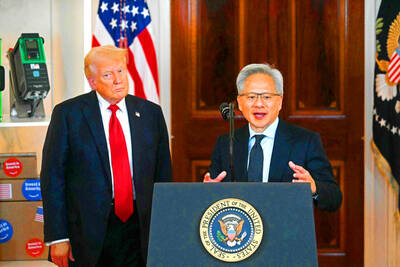TWi Pharmaceuticals Inc (安成藥業) chairman Chen Chih-ming (陳志明) has announced a plan to take the specialty generic drug developer private as he tries to invest his own money to turn the struggling company around.
The deal, which would proceed with a tender offer first and share swap later, would end a six-year run on public markets for a company that focuses on the development of high-barrier generic drugs targeting mainly the US market.
In a regulatory filing on Thursday, TWi said that Chen has offered to acquire 52.44 million TWi shares, or 43.57 percent of the company’s issued shares, at NT$72 per share on the open market through one of his personal investment entities.
The offer represented a premium of 12.15 percent from TWi’s closing price of NT$64.2 on Thursday.
The news sent TWi shares 9.97 percent higher on Friday to close at NT$70.6.
TWi has paid-in capital of NT$1.2 billion (US$38.95 million). The company became a publicly traded company on the Taipei Exchange in December 2013 after raising more than US$110 million with an initial public offering.
The company remained in the red last year, although its revenue grew 2 percent annually to NT$822.95 million.
Due to deteriorating margins and a reduction in non-operating gains, the company posted a net loss of NT$508.77 million last year, or losses per share of NT$4.23.
Chen owns a 3.62 percent stake in the company. Together with other principal stakeholders and affiliated parties, the chairman and founder of TWi has a strong influence over the company.
Chen’s investment entity launched the tender offer on Friday and the scheme would continue through April 15, with a minimum purchase of 6.02 million shares, or 5 percent of TWi’s issued shares, said KGI Securities Co (凱基證券), which is helping to manage the offer.
After completing the tender offer, Chen’s investment entity would work to swap shares with TWi at a one-to-one exchange ratio in a bid to acquire 100 percent of the drug developer’s shares, KGI said in a tender offer document.
The investment entity would then apply with the financial regulator to delist TWi from the Taipei Exchange, hoping to make the company a private entity in the third quarter, KGI said.
To strengthen TWi’s financial structure and adjust its product development strategy, Chen said it is necessary for the company to go private, with him investing in it, as new drugs tend to be high-risk and have lengthy development periods, and he did not want to compromise the interests of other stakeholders, local media reported on Friday.
TWi said in the regulatory filing that the board members would soon conduct an extensive review of strategic options before agreeing to the buyout to ensure that it is in the best interests of all shareholders.

Taiwan Semiconductor Manufacturing Co (TSMC, 台積電) last week recorded an increase in the number of shareholders to the highest in almost eight months, despite its share price falling 3.38 percent from the previous week, Taiwan Stock Exchange data released on Saturday showed. As of Friday, TSMC had 1.88 million shareholders, the most since the week of April 25 and an increase of 31,870 from the previous week, the data showed. The number of shareholders jumped despite a drop of NT$50 (US$1.59), or 3.38 percent, in TSMC’s share price from a week earlier to NT$1,430, as investors took profits from their earlier gains

AI TALENT: No financial details were released about the deal, in which top Groq executives, including its CEO, would join Nvidia to help advance the technology Nvidia Corp has agreed to a licensing deal with artificial intelligence (AI) start-up Groq, furthering its investments in companies connected to the AI boom and gaining the right to add a new type of technology to its products. The world’s largest publicly traded company has paid for the right to use Groq’s technology and is to integrate its chip design into future products. Some of the start-up’s executives are leaving to join Nvidia to help with that effort, the companies said. Groq would continue as an independent company with a new chief executive, it said on Wednesday in a post on its Web

CHINA RIVAL: The chips are positioned to compete with Nvidia’s Hopper and Blackwell products and would enable clusters connecting more than 100,000 chips Moore Threads Technology Co (摩爾線程) introduced a new generation of chips aimed at reducing artificial intelligence (AI) developers’ dependence on Nvidia Corp’s hardware, just weeks after pulling off one of the most successful Chinese initial public offerings (IPOs) in years. “These products will significantly enhance world-class computing speed and capabilities that all developers aspire to,” Moore Threads CEO Zhang Jianzhong (張建中), a former Nvidia executive, said on Saturday at a company event in Beijing. “We hope they can meet the needs of more developers in China so that you no longer need to wait for advanced foreign products.” Chinese chipmakers are in

POLICY REVERSAL: The decision to allow sales of Nvidia’s H200 chips to China came after years of tightening controls and has drawn objections among some Republicans US House Republicans are calling for arms-sale-style congressional oversight of artificial intelligence (AI) chip exports as US President Donald Trump’s administration moves to approve licenses for Nvidia Corp to ship its H200 processor to China. US Representative Brian Mast, the Republican chairman of the US House Committee on Foreign Affairs, which oversees export controls, on Friday introduced a bill dubbed the AI Overwatch Act that would require the US Congress to be notified of AI chips sales to adversaries. Any processors equal to or higher in capabilities than Nvidia’s H20 would be subject to oversight, the draft bill says. Lawmakers would have